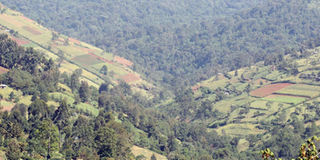Beleaguered Ogiek banking on African Court for redress

A section of Mau Forest. The Ogiek people are seeking to have parts of the Mau Forest Complex recognised as their ancestral land and a title deed issued.. PHOTO | FILE.
What you need to know:
- To stop the eviction, the Ogiek People’s Development Programme, and Centre for Minority Rights, filed a claim with the African Commission on Human and People’s Rights.
- Already the Ogiek People’s Development Programme has appealed to the people to reject the Sh400,000 given by the government for resettlement, saying that the Mau environment was the cradle of tradition, custom and culture of the Ogiek, which they cannot abandon.
The Ogiek people are seeking to have parts of the Mau Forest Complex recognised as their ancestral land and a title deed issued.
In a case pending before the Arusha-based African Court in Tanzania, they are represented by the African Commission on Human and People’s Rights.
They want the government to recognise their historic right and issue them with a legal document upon consultative demarcation of the land.
The lands lie within the eastern, western and southern parts of the forest complex, which they inhabit.
These form some of the regions in which the Ogieks’ 12 land settlement schemes fall.
On March 15, the court gave provisional orders directing the Kenyan government to reinstate restrictions it had imposed on land transactions in the Mau forest complex. The government was also ordered to refrain from irreparably prejudicing the main application before the court.
The Ogiek state that in 2009, they suffered a major setback when they were ordered to move out of their homes inside Mau as stringent laws governing forest management and conservation came into force, criminalising entry into forests. They eventually settled on the periphery of the massive complex.
To stop the eviction, the Ogiek People’s Development Programme, and Centre for Minority Rights, filed a claim with the African Commission on Human and People’s Rights.
MASSIVE VIOLATIONS
In 2012, the commission referred the case to the African Court.
An act by government to lift caveats on five acres and less in the Mau Forest Complex prompted a request to the court to order a reinstatement of the land transactions on all the parcels of land in the area.
The application read: “… this act has the potential to cause further irreparable damage to Ogieks, and will serve to perpetuate and expand the prejudice that is subject to the applicant’s main application.”
Apart from demanding the recognition of their ancestral land, the Ogiek want compensation for the loss of their property, delayed development, depleted natural resources and freedom to practise their religion and culture.
The full hearing begins in March 2014.
Already the Ogiek People’s Development Programme has appealed to the people to reject the Sh400,000 given by the government for resettlement, saying that the Mau environment was the cradle of tradition, custom and culture of the Ogiek, which they cannot abandon.
SLAP ON THE WRIST
“That will be killing our oneness, history, religion, tradition and culture. How can you give an Ogiek Sh400,000 to buy land elsewhere away from the Mau Forest Complex?” asked Daniel Kobei, the progamme’s executive director.
Worried about impostors who could jeopardise their rightful ownership of the land, Mr Kobei said they would establish authentic Ogikes.
“Our current number in the Mau is 33,000 which includes 11,000 adults. We also closely monitor our numbers through the Ogiek Council of Elders,” said Mr Kobei.
Although a large number of them live in the Mau forest, others inhabit parts of Kericho, Baringo, Nandi and Uasin Gishu counties. However, details on their exact population remain difficult to determine.





